If you’re considering Ooma for your business communication solution, but aren’t quite sure if it’s the right fit (or if there are better options out there), then this guide will break down some of the best alternatives to Ooma.
Before we compare some of the best Ooma alternatives, however, let’s look at what Ooma can do, and some of the most common reasons businesses want to look at other options first.
What is Ooma Office?
Ooma is a cloud-based VoIP (voice over internet protocol) phone service specially designed for smaller businesses. It offers a variety of features, including HD voice, call forwarding, caller ID, call waiting, voicemail, and more. Ooma Office pricing starts at $19.95 per user per month for their Essentials plan.¹
Why you might want a solution better than Ooma:
Here are three reasons you might want to consider an alternative to Ooma:
You need more integrations with popular tools
If you're using popular business tools like Salesforce, Zendesk, or HubSpot, you'll need a VoIP solution that can integrate with them. Ooma doesn't offer any integrations with these tools, which means you'll miss out on important features and data.
You need more advanced features at a lower price
As your business grows, you'll need more advanced features like auto-attendants, call recording, and video conferencing / messaging. Ooma's pricing doesn't scale well as you add more users and features, so you could end up paying more than you would with a competitor.
Your business makes a high volume of outbound calls
If your business makes a high volume of outbound calls, you'll need a solution that can handle the call volume without breaking the bank. Ooma's outbound calling rates are higher than a lot of its competitors, so you'll end up paying more per call.
The top 10 Ooma alternatives, ranked by ease of use + features
1. Dialpad: A truly unified communications solution
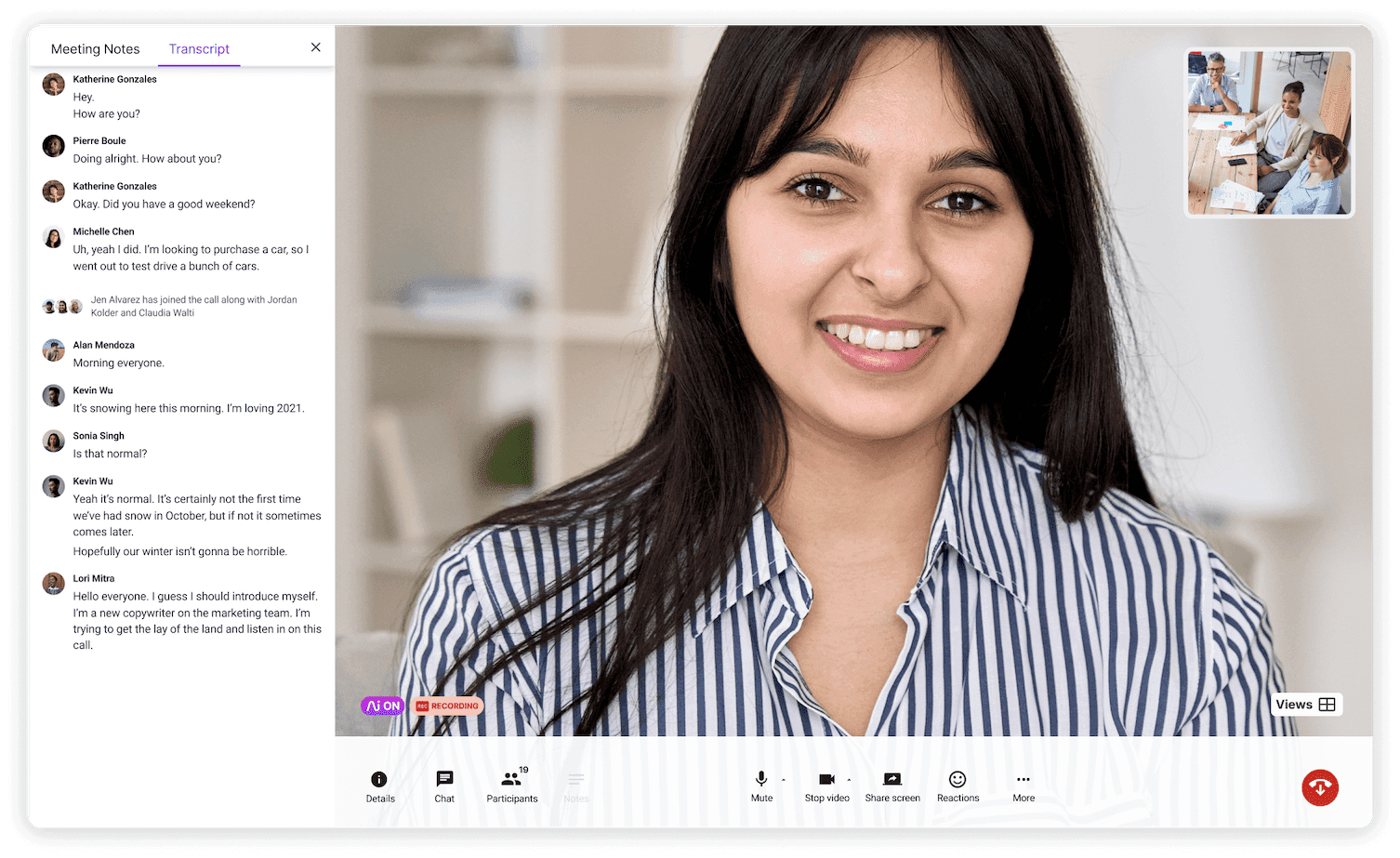
Okay first off, let us just acknowledge our obvious bias. Of course we’re going to put ourselves at the top of this list, right? But hear us out!
Dialpad is a cloud-based VoIP phone service that offers key features including HD voice and video calling, faxing, and SMS / text messaging. It also offers a robust set of features for businesses, such as call recording, auto-attendants, call groups, and desk phone compatibility. But the most notable difference between us and Ooma has got to be our plans—Dialpad includes more features at a lower cost—literally more bang for your buck. More details on that below.
What makes Dialpad an excellent alternative to Ooma?
Dialpad is designed to work for businesses big and small. For small business purposes, the Standard plan ($15/user per month) and Pro plan ($25/user per month) are both solid options.
Both of these Dialpad plans include unlimited calling, meetings, AI-powered call and voicemail transcription, live speech coaching, real-time analytics and reporting, Google Workspace and Microsoft 365 integrations. The Pro plan comes with a few extra features, including international SMS, CRM integrations (Salesforce, HubSpot, Zoho CRM, and more), and 24/7 live agent support (the Standard plan offers 24/5 live support).
Ooma Office plans start at $19.95/user per month (at the time this was written). Not only does it cost more than Dialpad’s Standard plan, but also doesn’t include a desktop app, video conferencing, call recording, voicemail transcription, Google Workspace and Microsoft 365 integrations, or call analytics. Dialpad includes all of these features across all its plans.
What you get with Dialpad that you don’t get with Ooma
Savings that go beyond the price
Starting at $15/user per month, not only does Dialpad Ai Voice cost less than Ooma Office (starting at $19.95/user per month), but you also get a lot more value for your dollar.
Dialpad includes vital business tools like call analytics and reporting, call routing, group calling, multi-level auto attendant, real-time call transcription, and more—in all their plans.
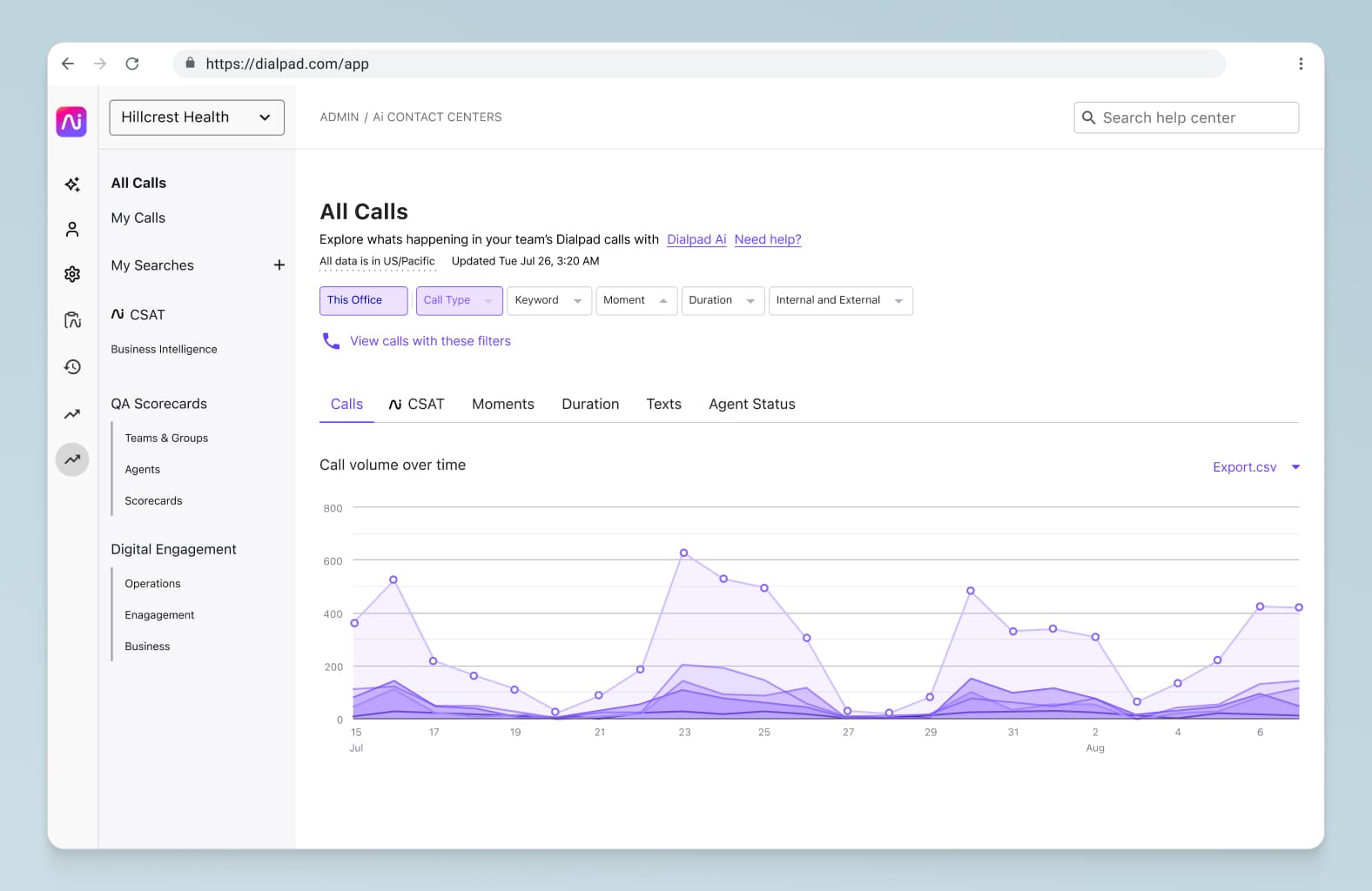
And—let’s just talk long-term for a moment—by combining a contact center with your team messaging, telephony, and sales coaching tool into a unified communications platform, Dialpad offers a much lower TCO (total cost of ownership) versus paying for all these programs separately. Not to mention the benefit of having all your conversations in one place.
🖥️ DIALPAD TIP:
Thinking of setting up a contact center in the future, or combining your existing contact center with your unified communications platform? Dialpad Ai Contact Center has you covered and seamlessly integrates into the same pane of glass you use to house the rest of your business interactions.
Integrations with popular tools
Ooma doesn’t offer integrations. Meanwhile, Dialpad integrates with most of the business tools you’re likely using already. For starters, it integrates with Google Calendar and Microsoft 365 to make scheduling video meetings really easy.
Using other tools like a CRM to track customer interactions? Dialpad’s Salesforce integration lets you receive and make calls and texts straight from Salesforce:
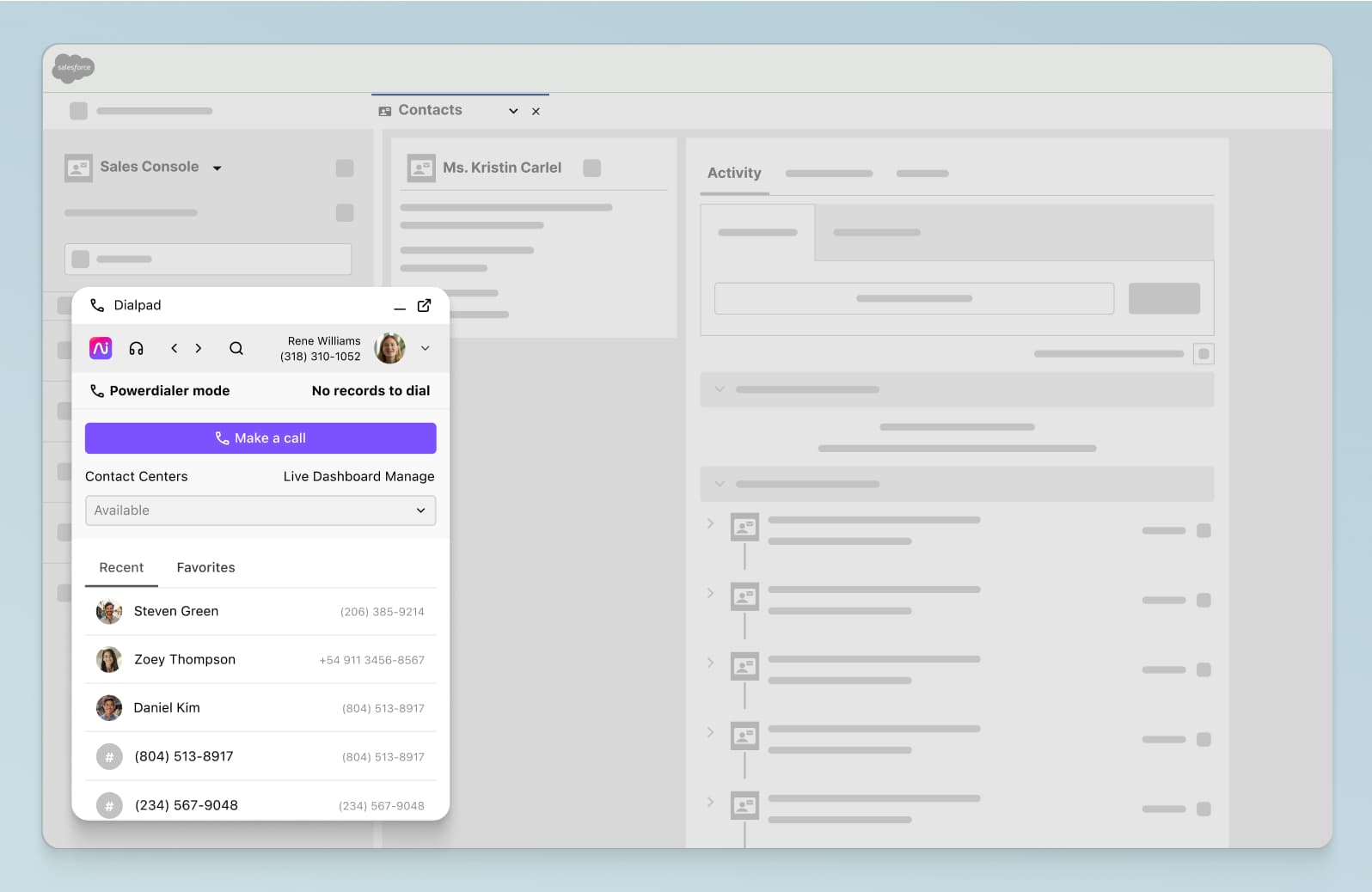
Rely on a whiteboard for brainstorming sessions? Dialpad’s Miro integration lets team members brainstorm together while seeing each other—just as if you were all in a meeting room whiteboarding together:
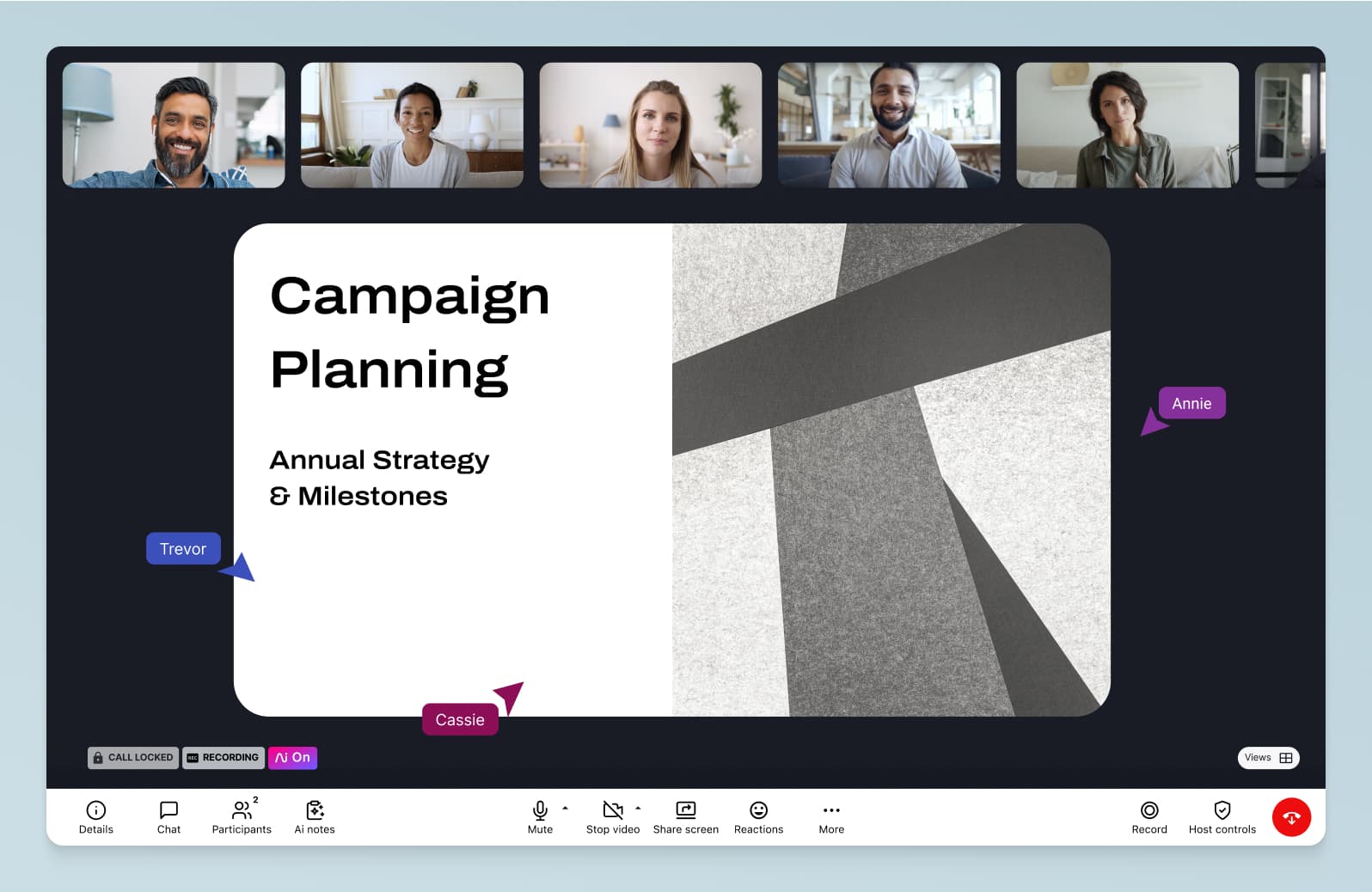
Real-time transcriptions
With Dialpad, you get AI-powered real-time voice transcription during every meeting. We’re talking full transcriptions, so if you miss something, you can just scroll up without interrupting the speaker. These transcripts can also be accessed immediately after a meeting is over, and will be sent to your email inbox as part of a post-call summary that also includes action items and key moments that were captured automatically:
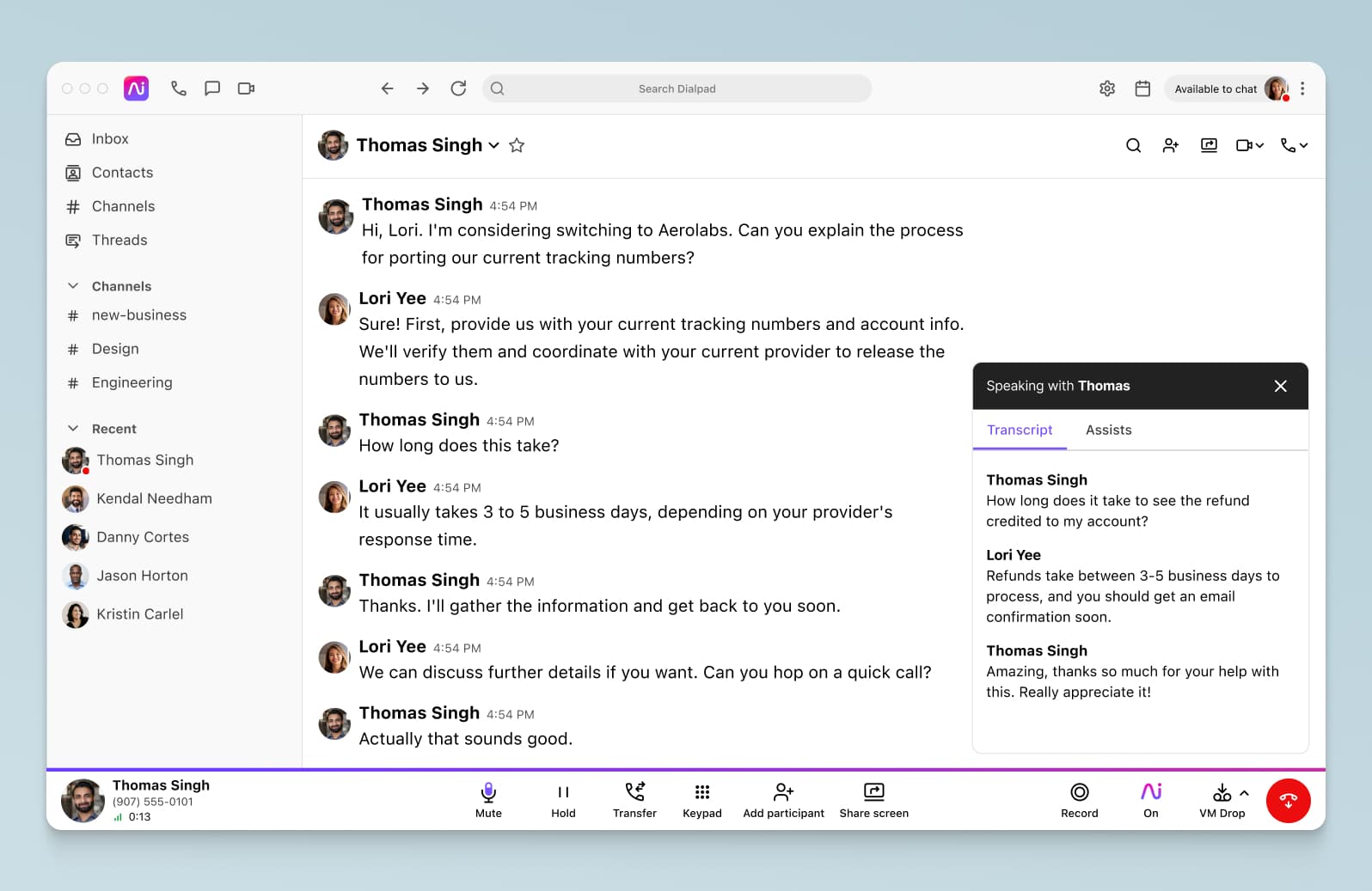
In other words, Dialpad eliminates the need to take notes and lets you search a meeting transcript for context rather than having to go through and listen to an entire recording, like with Ooma.
We love the transcription service with Dialpad. We transcribe calls, find opportunities for improvement, and have been effectively doubling the demos-to-calls ratio with better and more sophisticated analytics.
SCOTT HANSEN
FOUNDER AND SEO OF LEADSIGMA
Unlimited call recording
Dialpad and Ooma both offer call recording, meaning you can focus on your meeting and rest assured that you can always review it later if needed. The difference is call recording is available with all Dialpad plans, but only on Ooma’s Pro plan. (Oh, and our call recordings cap is unlimited!)
Ooma stores your recordings for up to 60 days, after which they’re no longer available.² They also don’t let you delete a call log before then, so if a call is recorded that shouldn’t have been (e.g. capturing confidential information about a customer without their knowledge or permission), you’ll need to contact their customer care team for support.³
Dialpad, on the other hand, lets you store call recordings forever unless you decide to delete them manually (which you can do at any time).
AI-enabled sales dialer
Does your business make a high volume of outbound calls? Dialpad also offers an AI-enabled sales dialer, with advanced features like voicemail drop, real-time agent coaching, and Salesforce power dialer capability. Ooma can’t do this.
📚 FURTHER READING:
Get a more detailed breakdown of Dialpad vs. Ooma.
Pricing
Starts at $15 per user per month, which includes unlimited calling in the US and Canada, unlimited call recordings, multi-level auto attendant, unlimited video meetings, real-time transcription, and more.
2. RingCentral

RingCentral is a large UCaaS / CCaaS provider that has been around for a long, long time, since the PBX days—though it’s been trying to evolve its functionalities and product to become a VoIP provider.
Today, it has a desktop and mobile app, and in many ways looks the part of a modern communications platform.
One thing to note about RingCentral is that it doesn’t own its full platform. Whereas ideally, a provider will have its own integrated communications and cloud contact center solution—which makes for one consistent experience and interface—RingCentral is white-labeling (aka. reselling) another company’s contact center platform. That’s why its communications app and contact center solution look so different and require separate logins:

What makes RingCentral a good alternative to Ooma?
If you’re looking for pricing that makes sense for a company that makes lots of phone calls, then even with RingCentral’s odd pricing structure, you might still come out ahead. Other than that, it does have more communication channels than Ooma packaged together, though unlike competitors like Dialpad, RingCentral isn't “cloud-native,” meaning its technology isn’t quite as modern or flexible.
(The benefits of that would be things like being able to spin up new contact center teams and set up new offices in very little time—minutes, not days or weeks.)
Pricing
Starts at $19.99 per user per month.²
3. Nextiva

Nextiva is another VoIP business phone system provider that's been around for a while. Like Dialpad and RingCentral, it markets itself as a unified communications solution that has phone call, messaging, and video conferencing functionality.
One thing to note about Nextiva is that it doesn't own its own product—it's reselling both its UCaaS4 and CCaaS solutions.³ This is usually not ideal because it can result in things like an inconsistent user experience, and difficulty getting support from an in-house team because you may be routed to a third-party customer support team. (Learn more about the best Nextiva alternatives.)
What makes Nextiva a good alternative to Ooma?
Pricing-wise, Nextiva compares is a bit cheaper than Ooma for a similar feature set. Note that you don't get SMS/MMS, auto attendant, video conference recording, or voicemail transcription with the cheapest plan, however.
Pricing
Starts at $18.95 per user per month.⁴
4. Aircall

Aircall is a cloud-based call center and phone system that’s pretty new on the scene (founded in 2014). It comes with most of the basic features you’d expect, like phone call recording, call monitoring, IVR, and voicemail.
What makes Aircall a good alternative to Ooma
Small businesses, in particular, tend to like Aircall because it’s fully geared toward, well, small businesses. Compared to most legacy solutions (and there are quite a few of them in the call center software space), Aircall is pretty easy to use and cheap.
Pricing
Starts at $30 per user per month.⁵
5. magicJack

The original magicJack was actually a piece of hardware that you’d plug into your computer’s USB port (kind of like an ATA adapter that you might use with a home phone and landline).
Since then, the company has released the more modern magicJack Plus, which comes with an Ethernet connection that can plug into your router instead. Even more recently, the magicApp was released, which lets you use magicJack’s functionality from your cell phone.
What makes magicJack a good alternative to Ooma
Long story short, magicJack is a very basic low-cost VoIP calling solution. That being said, if you are extremely price-conscious and/or barely use the phone at all, then magicJack is one of the cheapest things you’ll find.
Pricing
Starts at $43 per user per year (only annual plans available).⁶
6. Google Voice

Google Voice is a VoIP phone service that offers HD voice and video calling, and messaging. It also offers a lot of features for businesses, like call forwarding, spam call blocking, and voicemail transcription.
What makes Google Voice a good alternative to Ooma
If you use a lot of Google products (e.g. Calendar, Mail, Meet), picking up Google Voice will be a breeze. Built for Google Workspace, Voice has a minimalist look and feel that will be all too familiar to Google users and fit seamlessly into your workflow.
Pricing
Starts at $10 per user per month.⁷
7. 8x8
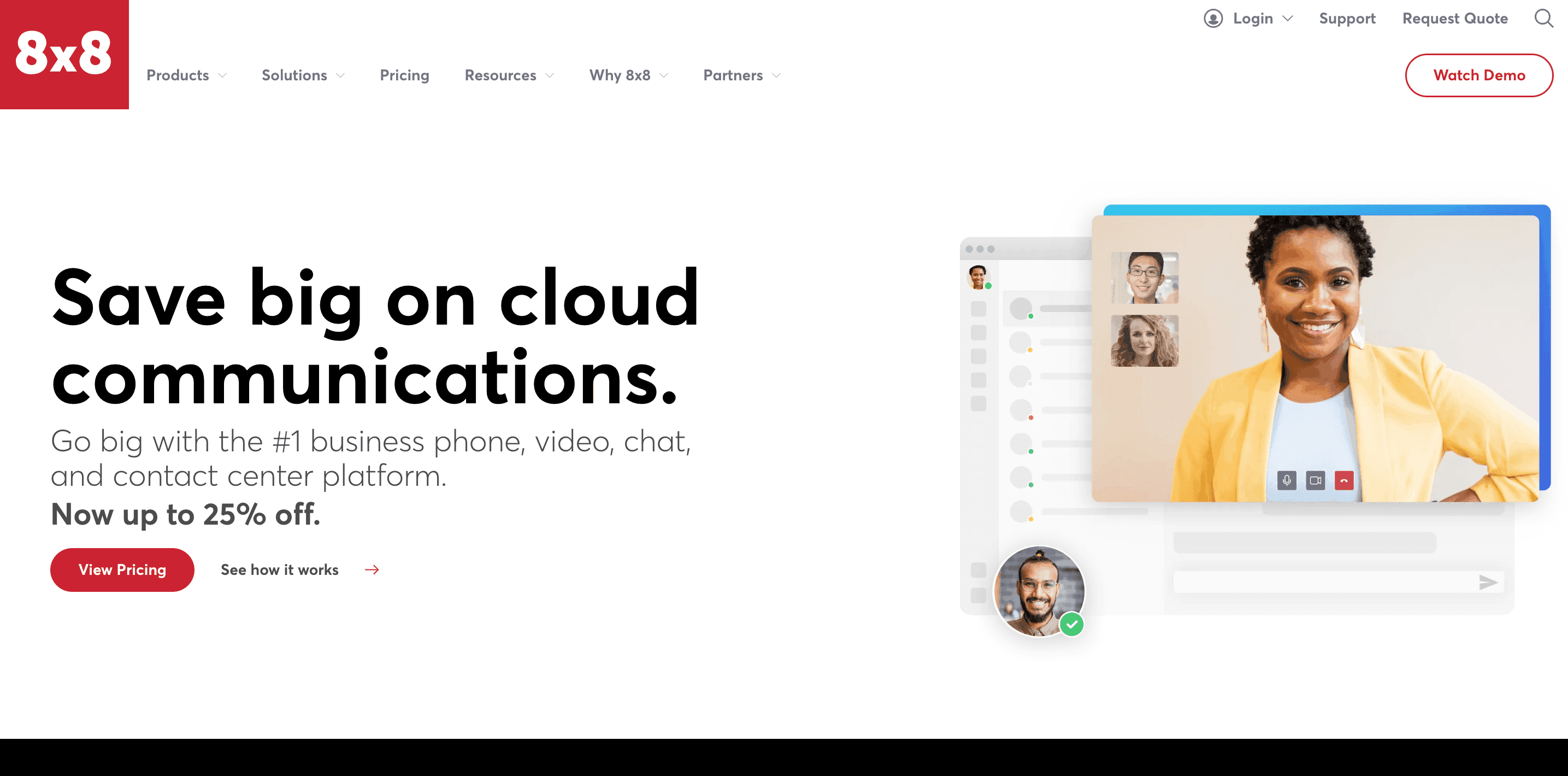
8x8 is a unified communications platform that’s been around since the PBX telephony days. It did make an attempt to build its own contact center product with features like IVR and CRM integrations at one point, but has since given up and is now reselling a third-party product.⁸
What makes 8x8 a good Ooma alternative?
Not only is their starting price lower than Ooma’s, they also have more plan options in general so you’re able to better customize your plan to what your business needs.
Pricing
Starts at $15 per user per month.⁹
8. Zoom

As far as group video conferencing software that supports large numbers of callers goes, Zoom is a well-known name. With a simple UI and easy signup process, Zoom became especially popular during the pandemic.
The one big asterisk with Zoom is that, because of its mainstream popularity, it’s become a target for hackers and “Zoombombings”—so much so that Google, NASA, and many other organizations have banned its use.
What makes Zoom a good alternative to Ooma?
If you’re a small business looking for a minimal phone, chat, and video conferencing solution, Zoom’s got you covered at a lower price point. For very small teams, you might even be able to get away with their free plan.
Pricing
Starts at $14.99 per user per month.¹⁰
9. GoTo Connect

You’ve probably heard “GoTo Meeting” more than “GoTo Connect,” but these are essentially a video and audio conferencing solution that’s part of LogMeIn’s suite of products.
If you’re looking for more of a UCaaS solution that includes a mobile phone app, virtual voicemail, call forwarding, and an auto attendant—basically a cloud phone system that includes other communication channels—you can opt for LogMeIn’s GoTo Connect bundle package.
What makes GoTo Connect a good alternative to Ooma?
If you want access to the other products in LogMeIn’s suite, GoTo Connect might make sense for you. Otherwise, from a pricing and feature perspective, the two are pretty comparable.
Pricing
Starts at $27 per user per month.¹¹
10. Vonage

Vonage is a business and residential communications solution that lets you communicate through different channels in an app. However, even though it’s an established brand, there's no free video conferencing plan and you don’t get meeting recordings unless you’re on the most expensive plan.
What makes Vonage a good alternative to Ooma?
Vonage is overall pretty similar in functionality to Ooma—it’s more down to your personal preference, what interface you like, and if there’s any niche features that you get with one and not the other.
Pricing
Starts at about $11 per user per month.¹²
Is Dialpad the best Ooma alternative? Find out with a free trial
There's no one-size-fits-all answer to the question of whether or not Dialpad is the best Ooma alternative—it depends on your specific business needs.
Dialpad offers a wide range of features at a lower price point than Ooma, making it a good choice for businesses that need more advanced features without breaking the bank.
The good news is you can try Dialpad free for 14 days to see if it's a good fit for your company!
Sign up for a 14-day free trial of Dialpad
You'll get set up with a virtual number in minutes and get to see for yourself if Dialpad is the right Ooma alternative for your business. Or, take a self-guided interactive tour of the app first!
Frequently asked questions about Ooma alternatives
¹ ooma.ca/business-voip/ooma-office-plans/
² ringcentral.com/ca/en/office/plansandpricing.html#office
³ businesswire.com/news/home/20210609005705/en/Nextiva-and-Five9-Team-Up-to-Help-Businesses-Deliver-Seamless-Customer-Communications
⁴ nextiva.com/nextiva-pricing.html
⁵ aircall.io/pricing/
⁶ magicjack.com/account/mjLandingpages.do?page=plans
⁷ workspace.google.com/intl/en_ca/products/voice/
⁸ enterpriseitworld.com/8x8-and-genesys-partner-to-integrate-8x8-cloud-unified-communications-with-genesys-cloud-cx/
⁹ 8x8.com/products/plans-and-pricing?locale=us
¹⁰ zoom.us/pricing
¹¹ goto.com/pricing/connect
¹² vonage.ca/en/unified-communications/pricing/










